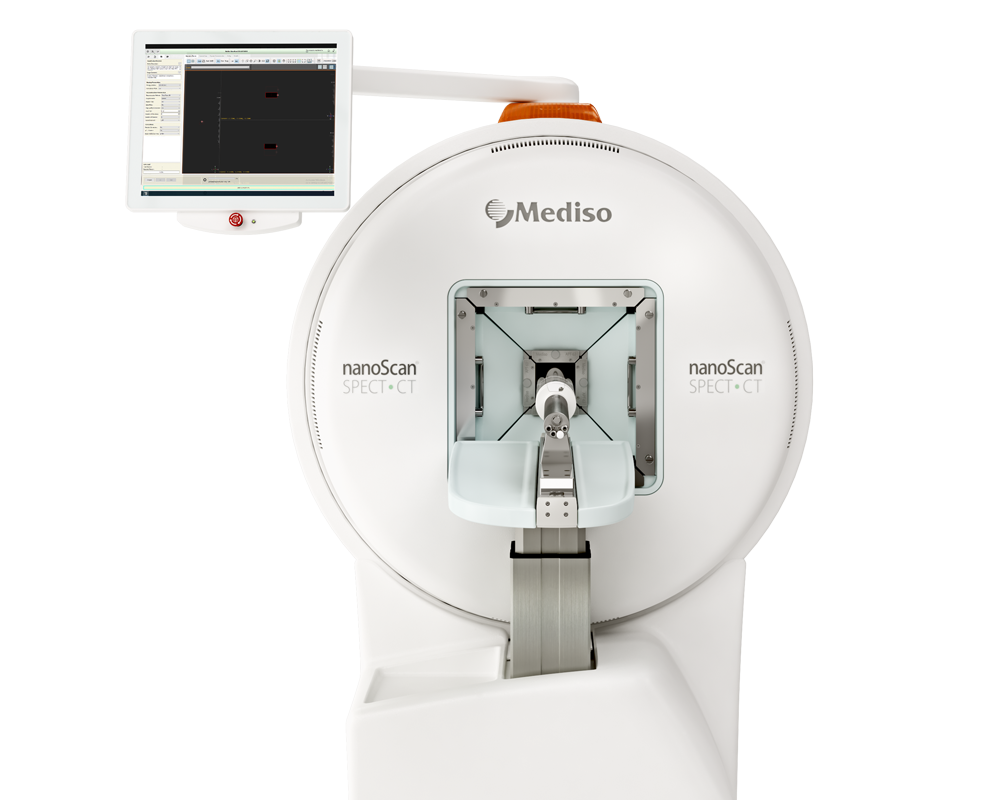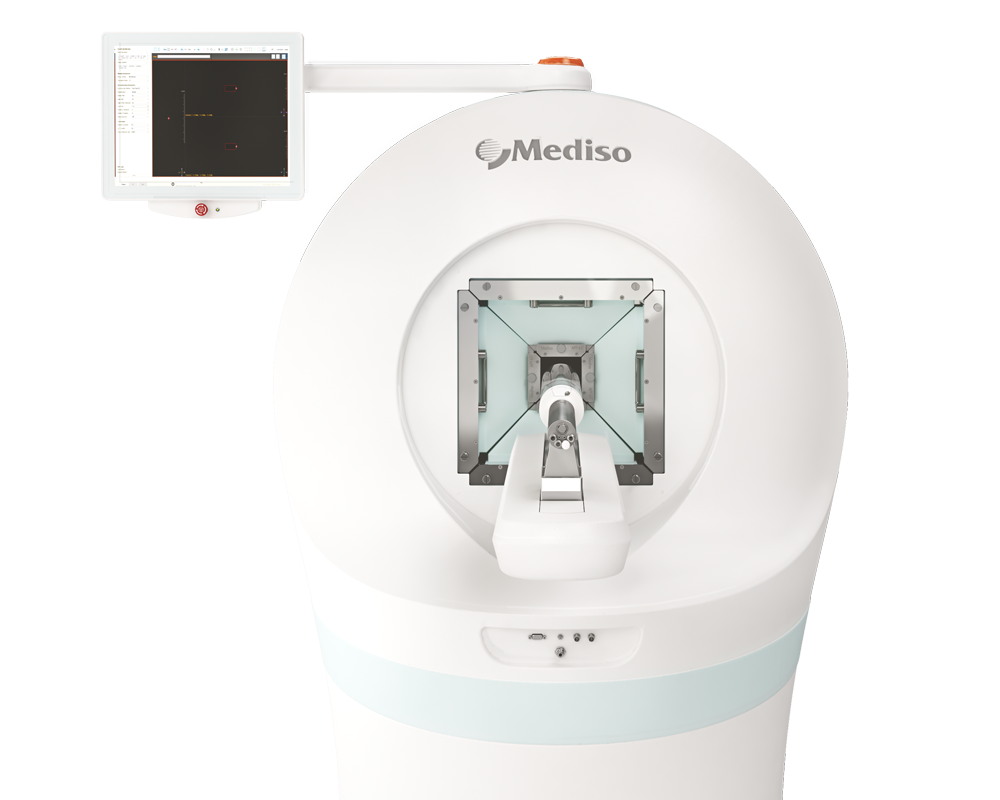The radiosensitizer Onalespib increases complete remission in 177Lu-DOTATATE-treated mice bearing neuroendocrine tumor xenografts
2020.01.07.
Sara Lundsten et al, European Journal of Nuclear Medicine and Molecular Imaging, 2020
Summary
Purpose 177Lu-DOTATATE targeting the somatostatin receptor (SSTR) is utilized for treatment of neuroendocrine tumors (NETs). Onalespib, a heat shock protein 90 (HSP90) inhibitor, has demonstrated radiosensitizing properties and may thus enhance the effect of 177Lu-DOTATATE. Consequently, the aim of this study was to assess the potential of Onalespib in combination with 177Lu-DOTATATE in vivo and to examine the toxicity profiles of the treatments.
Methods 177Lu-DOTATATE selectivity and distribution in NET xenografts were studied using biodistribution and autoradiography. Therapeutic effects of Onalespib in combination with 177Lu-DOTATATE were studied in NET xenografts. Histological analyses were used to assess molecular effects from treatment and to establish toxicity profiles.
Results Biodistribution and autoradiography confirmed the SSTR-selective tumor uptake of 177Lu-DOTATATE, which was unaffected by Onalespib treatment. Immunohistochemistry verified molecular responses to Onalespib therapy in the tumors. While Onalespib and 177Lu-DOTATATE monotherapies resulted in a 10% and 33% delay in tumor doubling time compared with control, the combination treatment resulted in a 73% delayed tumor doubling time. Moreover, combination treatment increased complete remissions threefold from 177Lu-DOTATATE monotherapy, resulting in 29% complete remissions. In addition, histological analyses demonstrated radiation-induced glomerular injury in the 177Lu-DOTATATE monotherapy group. The damage was decreased tenfold in the combination group, potentially due to Onalespib-induced HSP70 upregulation in the kidneys. Conclusion Treatment with Onalespib potentiated 177Lu-DOTATATE therapy of NET xenografts with a favorable toxicity profile. Utilizing Onalespib’s radiosensitizing properties with 177Lu-DOTATATE may lead to better therapeutic results in the future and may reduce unwanted side effects in dose-limiting organs.
Results from nanoScan SPECT/CT
6 × 106 BON cells (established from a lymph node metastasis of a pancreatic carcinoid tumor) were injected to the right flank of female BALB/c nu/nu mice. When tumors approached 50 mm3, animals were randomized into four groups: placebo (N = 15), Onalespib (N = 7), 177Lu-DOTATATE (N = 12), and combination (N = 7). The 4-day treatment regime consisted of a daily i.p. injection of 30 mg/kg Onalespib or placebo on days 1–4 and a daily i.v. injection of 4 MBq 177Lu-DOTATATE (0.1 μg) or placebo on days 2–4. Onalespib and 177Lu-DOTATATE injections were given concomitantly. Endpoint was set to a tumor size of 1 cm3 or weight loss of more than 10%compared with day of treatment start.
SPECT/CT imaging was performed to confirm the complete remission of animals with no discernible tumor at study endpoint. 24 h post-injection of 40 MBq of 177Lu-DOTATATE (1 μg) animals were imaged with a static whole-body tomographical scan in the NanoScan SPECT/CT. First, a whole-body CT scan was acquired with following parameters. Scan method: Semi circle FOV; projections 480; X-ray, 50 kVp and 600 μA; binning, 1:4; acquisition time, 2 min 47 s. SPECT scan was performed on same scan range as CT, for 60 min with following parameters. Frame time, 60 s; acquisition over 208.4, 112.90, and 56.10 keV. SPECT raw data were reconstructed in Nucline software using TeraTomo 3D algorithm with 3 subsets, 48 iterations and corrected for scatter and attenuation artifacts. The CT raw files were reconstructed using Filter Back Projection. SPECT and CT dicom files were fused and analyzed using PMOD v3.510.
Results show:
- In vivo therapy study revealed that Onalespib significantly delayed tumor growth with a 10% delay in tumor doubling time from 4.8 days in control group to 5.3 days.
- 177Lu-DOTATATE and combination treatment resulted in further prolongation of tumor doubling time to 6.4 and 8.3 days, corresponding to a delay of 33% and 73%, respectively. The increased growth delay correlated with an increase in survival with Onalespib monotherapy slightly affecting median survival.
- 177Lu- DOTATATE and combination groups demonstrated greater effects, with an increased survival to 35 and 37 days, respectively.
- No animals in the control or Onalespib groups demonstrated complete remissions.
- The 177Lu-DOTATATE and combination therapy groups were able to completely eradicate the tumors in several animals, resulting in 8%complete remissions in the 177Lu-DOTATATE group and 29% complete remissions in the combination group.
 Fig. 2 In vivo xenograft study. a Tumor growth over time (mean, SEM. n ≥ 7). Data was fitted to an exponential growth curve (dashed line). b Survival proportions of mice (n ≥ 7)
Fig. 2 In vivo xenograft study. a Tumor growth over time (mean, SEM. n ≥ 7). Data was fitted to an exponential growth curve (dashed line). b Survival proportions of mice (n ≥ 7)
- Complete remissions were further validated at the endpoint of the study through SPECT/CT analysis

Fig. 3 Representative SPECT/CT images at endpoint for mouse sacrificed due to size of tumor (a) and mouse reaching complete remission (b)
Full article on springer.com
Comment pouvons-nous vous aider?
N'hésitez pas à nous contacter pour obtenir des informations techniques ou à propos de nos produits et services.
Contactez-nous
